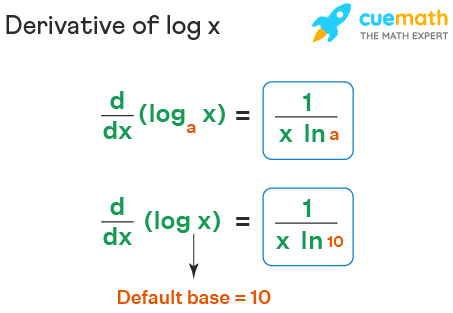Derivative of log x
Before going to find the derivative of log x, let us recall what is "log". "log" is a common logarithm. i.e., it is a logarithm with base 10. If there is no base written for "log", the default base is 10. i.e., log = log₁₀. We can find the derivative of log x with respect to x in the following methods.
- Using the first principle
- Using implicit differentiation
- Using the derivative of ln x
Here we are not only going to find the derivative of log x (with base 10) but also are going to find the derivative of log x with any base.
What is the Derivative of log x?
The derivative of logₐ x (log x with base a) is 1/(x ln a). Here, the interesting thing is that we have "ln" in the derivative of "log x". Note that "ln" is called the natural logarithm (or) it is a logarithm with base "e". i.e., ln = logₑ. Further, the derivative of log x is 1/(x ln 10) because the default base of log is 10 if there is no base written.
The derivative of log x (base 10) with respect to x is denoted by d/dx (log x) or (log x)'. Thus,
- d/dx(logₐ x) (or) (logₐ x)' = 1/(x ln a)
- d/dx(log x) (or) (log x)' = 1/(x ln 10)

Since the derivative of log x directly follows from the derivative of logₐ x, it is sufficient to prove the latter one. Let us prove this formula using different methods in the upcoming sections.
Derivatives of Logs
We are going to discuss the derivatives of logs. i.e., the derivatives of both common and natural logarithms. We have already seen that the derivative of logₐ x is 1 / (x ln a). Here, logₐ x is called as a common logarithm. But we have another type of logarithm called the natural logarithm. It is represented as ln x. It is a logarithm with base "e" and hence it can be written as ln x = logex. Now, we have
d/dx (logₐ x) = 1 / (x ln a)
Substitute a = e on both sides. Then we get:
d/dx (loge x) = 1 / (x ln e)
By the properties of natural logarithms, ln e = 1. So
d/dx (loge x) = 1 / (x · 1)
Thus, d/dx (loge x) = 1.
Replacing loge x with ln x back, we get d/dx (ln x) = 1/x.
Hence, the derivatives of logs are:
- d/dx (logₐ x) = 1 / (x ln a) (this is the derivative of common logarithm)
- d/dx (ln x) = 1/x (this is the derivative of natural logarithm)

Derivative of log x Proof by First Principle
We will prove that d/dx(logₐ x) = 1/(x ln a) using the first principle (definition of the derivative).
Proof:
Let us assume that f(x) = logₐ x.
By first principle, the derivative of a function f(x) (which is denoted by f'(x)) is given by the limit,
f'(x) = limₕ→₀ [f(x + h) - f(x)] / h
Since f(x) = logₐ x, we have f(x + h) = logₐ (x + h).
Substituting these values in the equation of first principle,
f'(x) = limₕ→₀ [logₐ (x + h) - logₐ x] / h
Using a property of logarithms, logₐ m - logₐ n = logₐ (m/n). By applying this,
f'(x) = limₕ→₀ [logₐ [(x + h) / x] ] / h
= lim ₕ→₀ [logₐ (1 + (h/x))] / h
Assume that h/x = t. From this, h = xt.
When h→0, h/x→0 ⇒ t→0.
Then the above limit becomes
f'(x) = limₜ→₀ [logₐ (1 + t)] / (xt)
= limₜ→₀ 1/(xt) logₐ (1 + t)
By using property of logarithm, m logₐ a = logₐ am. By applying this,
f'(x) = limₜ→₀ logₐ (1 + t)1/(xt)
By using a property of exponents, amn = (am)n. By applying this,
f'(x) = limₜ→₀ logₐ [(1 + t)1/t]1/x
By applying the property logₐ am = m logₐ a,
f'(x) = limₜ→₀ (1/x) logₐ [(1 + t)1/t]
Here, the variable of the limit is 't'. So we can write (1/x) outside of the limit.
f'(x) = (1/x) limₜ→₀ logₐ [(1 + t)1/t] = (1/x) logₐ limₜ→₀ [(1 + t)1/t]
Using one of the formulas of limits, limₜ→₀ [(1 + t)1/t] = e. Therefore,
f'(x) = (1/x) logₐ e
= (1/x) (1/logₑ a) (because 'a' and 'e' are interchanged)
= (1/x) (1/ ln a) (because logₑ = ln)
= 1 / (x ln a)
Thus, we proved that the derivative of logₐ x is 1 / (x ln a) by the first principle.
Derivative of log x Proof by Implicit Differentiation
We will prove that d/dx(logₐ x) = 1 / (x ln a) using implicit differentiation.
Proof:
Assume that y = logₐ x. Converting this into the exponential form would give ay = x. By taking the derivative on both sides with respect to x, we get
d/dx (ay) = d/dx (x)
By using the chain rule,
(ay ln a) dy/dx = 1
dy/dx = 1/(ay ln a)
But we have ay = x. Therefore,
dy/dx = 1 / (x ln a)
Hence we proved the derivative of logₐ x to be 1 / (x ln a) using implicit differentiation.
Derivative of log x Proof Using Derivative of ln x
Note that the derivative of ln x is 1/x. We can convert log into ln using change of base rule. Let us see how.
Proof:
Let us assume that f(x) = logₐ x.
By change of base rule, we can write this as,
f(x) = (logₑ x) / (logₑ a)
We know that logₑ = ln. Thus,
f(x) = (ln x) / (ln a)
Now we will find its derivative.
f'(x) = d/dx [(ln x) / (ln a)]
= 1/ (ln a) d/dx (ln x)
= 1 / (ln a) · (1/x)
= 1 / (x ln a)
Thus, we have proved that the derivative of logₐ x with respect to x is 1/(x ln a).
Important Notes on Derivative of log x:
Here are some important points to note about the derivative of log x.
- The derivative of logₐ x is 1/(x ln a).
- The derivative of log x is 1/(x ln 10).
- The derivatives of ln x and log x are NOT same.
d/dx(ln x) = 1/x whereas d/dx (log x) = 1/(x ln 10). - As the domain of logₐ x is x > 0, d/dx (logₐ |x|) = 1/(x ln a).
Also, d/dx(log |x|) = 1/(x ln 10).
☛ Related Topics:
Here are some topics that are related to the derivative of logₐ x.
Solved Examples on Derivative of log x
-
Example 1: Find the derivative of log (x2 + 1).
Solution:
Let f(x) = log (x2 + 1).
Using the derivatives of logs formulas, d/dx (log x) = 1/(x ln 10).
By using chain rule,
f'(x) = 1/[(x2 + 1) ln 10] d/dx (x2 + 1)
= 1/[(x2 + 1) ln 10] · (2x)
= (2x) / [(x2 + 1) ln 10]
Answer: The derivative of the given function is (2x) / [(x2 + 1) ln 10].
-
Example 2: Find the derivative of x/(log x).
Solution:
Let f(x) = x/(log x) = u/v
Using the quotient rule,
f'(x) = (vu' - uv')/v2
We know that the derivatives of log x and x are 1/(x ln 10) and 1 respectively. So
f'(x) = (log x (1) - x [1/(x ln 10)] ) / (log x)2
= (log x - (1 / ln 10) ] / (log x)2
Answer: The derivative of the given function is (log x - (1 / ln 10) ] / (log x)2.
-
Example 3: Find the derivative of log₂√x.
Solution:
Let f(x) = log₂√x = log₂ (x1/2) = 1/2 log₂ x
We know that the derivative of log x with base a is 1/(x ln a).
Therefore,
f'(x) = (1/2) [1/(x ln 2)] = 1/(2x ln 2)
Answer: The derivative of the given function is 1/(2x ln 2).

FAQs on Derivative of log x
What is the Derivative of log x Base 10 With Respect to x?
The derivative of log x (base 10) is 1/(x ln 10). If the log has a base "a", then its derivative is 1/(x ln a). i.e., d/dx(logₐ x) = 1/(x ln a).
Is the Derivative of log x Equal to 1/x?
No, the derivative of log x is NOT 1/x. In fact, the derivative of ln x is 1/x. But the derivative of log x is 1/(x ln 10).
What is nth Derivative of log x?
The first derivative of log x is 1/(x ln 10). The second derivative is -1/(x2 ln 10). Its third derivative is 2/(x3 ln 10). If we continue this process, the nth derivative of log x is [(-1)n-1 (n-1)!]/(xn ln 10).
What is the Derivative of log x Base a?
The derivative of log x with base a is 1/(x ln a). We can prove this using several methods. For more information, click on the following:
- Derivative of log x by First Principle
- Derivative of log x by Implicit Differentiation
- Derivative of log x Using Derivative of ln x
What is the Second Derivative of log x?
The first derivative of log x is 1/(x ln 10). This can be written as x-1/(ln 10). Thus, its second derivative is (-1x-2)/(ln 10) (or) -1/(x2 ln 10).
What are the Formulas for Derivatives of Logs?
There are two types of formulas for derivatives of logs. One formula talks about the derivative of a common logarithm whereas the other formula talks about the derivative of the natural logarithm.
- For common log: d/dx (logₐ x) = 1 / (x ln a)
- For natural log: d/dx (ln x) = 1/x
How to Find the Derivative of log(x + 1)?
We know that the derivative of log x is 1/(x ln 10). Again, by the application of chain rule, the derivative of log(x+1) is 1/(x+1) · d/dx(x+1) = 1/(x+1).
What is the Derivative of log x whole square?
The derivative of (log x)2 using the chain rule is 2 log x d/dx(log x) = 2 log x [ 1/(x ln 10)] = (2 log x) / (x ln 10).
What is the Derivative of log x with base 2?
The derivative of log x with base a is 1/(x ln a). Hence, the derivative of log x with base 2 is 1/(x ln 2).
What is the Derivative of log x^2?
We know that the derivative of log x is 1/(x ln 10). By applying chain rule, the derivative of log x2 is 1/(x2) · (2x) = 2/x.
visual curriculum
